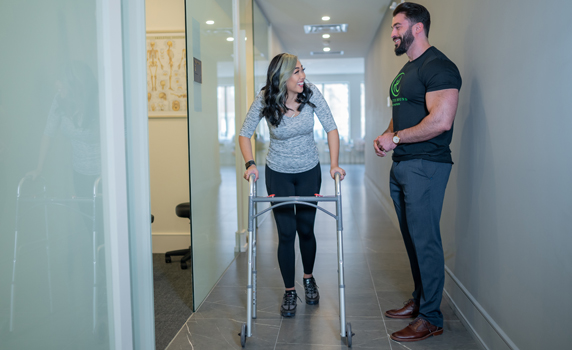The Outpatient Rehabilitation Program is an individualized, coordinated, outcomes-focused program that promotes early intervention and optimizes the activities and participation of the person served. The goals and outcomes of each individual require a multidisciplinary approach to achieve the desired result for the individual. Therefore, our interdisciplinary team of healthcare providers includes physiotherapists, chiropractors, occupational therapists, psychologists, naturopaths, and many more. In addition, we work with clients who have acute injuries to clients who want to sustain a healthy lifestyle, so whether you are recovering from an injury or would like to participate in one of our wellness programs, such as our weight loss program, we can help! Check our “contact us” page for a complete list of the communities in which we provide services.

OUTPATIENT REHABILITATION
WHO CAN ENROLL
The Outpatient Rehabilitation Program is appropriate for people who have experienced the following:
- Post-Stroke Mobility and Function
- Disk Herniation
- Sciatica
- Neck pain
- Back pain
- Spinal Instability
- Muscle strains
- Postural strain
- Ligament sprains/tears
- Ankle sprains
- Knee injuries (ACL, PCL, MCL, LCL)
- Shin Splints
- Bursitis
- Nerve entrapments
- Tendonitis/Tendonosis/Tendinopathy
- Arthritis and Osteoarthritis
- Degenerative Joint Disease (DJD)
- Degenerative Disc Disease
- Rib joint sprain/dysfunction
- Tailbone pain (coccydynia)
- Shoulder Impingement
- Rotator Cuff Injuries or Repairs
- Adhesive Capsulitis (Frozen Shoulder)
- Medial Epicondylitis (Golfer’s Elbow)
- Carpal Tunnel Syndrome
- De Quervain’s Syndrome
- Iliotibial (IT) Band Syndrome
- Patellofemoral Syndrome
- Motor Vehicle Accidents
- Workplace Injuries
- Lateral Epicondylitis
(Tennis Elbow) - Headaches (Cervicogenic, Migraine, Tension-Type)
- Temporomandibular Joint Dysfunction (TMJ)
- Repetitive strain or cumulative trauma disorders (tissue/muscle overuse)
- Post-Operative and Post-Surgical Rehabilitation care of the Musculoskeletal system (Joints, Tendons, Bones, Meniscus, Cartilage and muscles)
EXCLUSION CRITERIA
This care program has some exclusion criteria, which are significant red flags that may prevent the individual from being eligible to participate in this program. Please consult a healthcare practitioner or contact us to confirm eligibility.
WHAT CAN I EXPECT ON MY FIRST VISIT
A health care provider will assess treatment planning to initialize the Program of Care. The assessment includes the following: taking a complete medical history, subjective evaluation of the primary complaints related to the injury, a thorough physical examination including range of motion evaluation, orthopedic testing, muscle testing, and neurological testing. The health care provider will also administer outcome measures to obtain baseline measures of pain and function. These may include but are not limited to the Numeric Pain Rating Scale (NPRS), the Oswestry Disability Index, the Neck Disability Index (NDI), and the Lower Extremity Functional Scale (LEFS), or the Upper Extremity Functional Scale (UEFS).
The Health Care Provider will also assess for possible Yellow flags, indicating psychological risk factors that may impact their recovery due to behavior, expectations, and recovery from injury. Finally, a discussion on achievable goals from the treatment program will be discussed as well as the responsibilities of the person served and health care provider throughout the program.
WHEN WILL I BE DISCHARGED
The duration of the Outpatient Rehabilitation Program is determined after the initial assessment and depends on the needs of each person served, including the severity of the injury, and may vary based on factors that may delay recovery. However, one or more of the following criteria must be met to be discharged from the outpatient rehabilitation program:
- The person served has achieved the goals established with the rehabilitation team.
- The services of the healthcare providers are no longer necessary or appropriate.
- The person’s progress has reached a plateau, and they no longer benefit from the program’s services.
- When the person served cannot tolerate the demands of the program and the appropriate referrals have been made.

